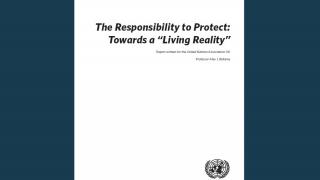
11 June 2013
UNA-UK’s first Responsibility to Protect (R2P) briefing paper examines the emergence, current status and future implementation of the R2P norm, and was written by Professor Alex J. Bellamy.
In 2005, at the United Nations World Summit, world leaders unanimously agreed that states have a ‘Responsibility to Protect’ (R2P) populations from genocide, war crimes, ethnic cleansing and crimes against humanity. Having been employed by the UN in response to crises from Darfur to Mali, the R2P principle now faces the ‘risks of relevance’. In other words, the debate on R2P has shifted towards implementation, particularly with regard to “hard cases” such as Syria. In this report, Professor Bellamy outlines the current status of the R2P norm, and suggests pathways to its effective implementation.
Professor Bellamy begins by highlighting the norm’s continuing progress, citing the international response to Kenya’s 2007 post-election violence as a positive example of R2P in action. However, R2P has since been troubled by the risks of relevance. Professor Bellamy argues that attempts to apply the language and principles of R2P to cases for which it was not designed (notably Cyclone Nargis and Russia’s invasion of Georgia) have served to obscure the scope of the norm. This has been exacerbated by allegations that interventions in Cote d’Ivoire and Libya, both of which were justified by reference to R2P, overstepped their bounds by pushing for regime change. Meanwhile cases in which mass atrocities have been allowed to happen, such as the events in Sri Lanka in 2009, demonstrate the limitations of R2P’s progress.
Based on this analysis, Professor Bellamy identifies five key challenges which must be addressed if R2P is to be successfully implemented: (1) Deepening the engagement of Member States and Regional Arrangements; (2) Making prevention of the four crimes a living reality; (3) Mainstreaming R2P goals across the UN system; (4) Learning lessons about the implementation of enforcement mandates; (5) Protecting the consensus on R2P.
About the author
Professor Alex Bellamy is Professor of International Security at Griffith University, Non-Resident Senior Adviser at the International Peace Institute, and Director (International) of the Asia Pacific Centre for the Responsibility to Protect.






